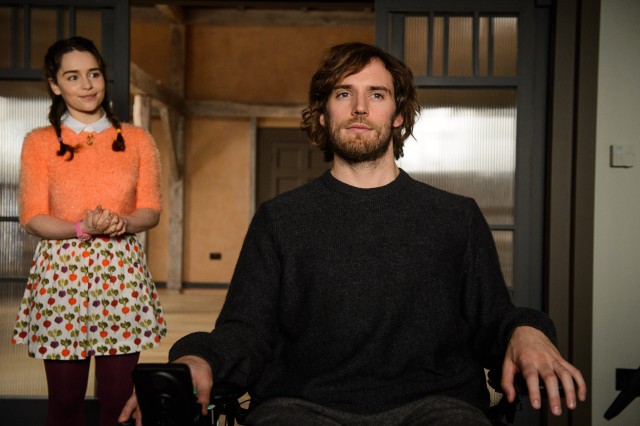Me Before You Movie Review

Me Before You is now available on home video. Read our review of the Blu-ray
or keep scrolling for a different take on the film by Jake Lipson.
 |
Me Before You
Theatrical Release: June 3, 2016 / Running Time: 110 Minutes / Rating: PG-13 Director: Thea Sharrock / Writer: Jojo Moyes (novel & screenplay) Cast: Emilia Clarke (Louisa "Lou" Clark), Sam Claflin (Will Traynor), Janet McTeer (Camilia Traynor), Charles Dance (Stephen Traynor), Brendan Coyle (Bernard Clark), Matthew Lewis (Patrick), Vanessa Kirby (Alicia Dewar), Samantha Spiro (Josie Clark), Joanna Lumley (Mary Rawlinson) |
Buy Me Before You from Amazon.com: Blu-ray • DVD • Instant Video
By Jake Lipson
In reviewing Me Before You, it is important to note that I am living with a disability. I use a wheelchair and I work with attendants on a daily basis to assist me with activities of daily living. Given the subject matter, Despite what this utterly unnecessary opening might lead you to believe, Will is not the protagonist. That's actually Louisa Clark (Emilia Clarke, "Game of Thrones"), a recently laid-off waitress who is hired as Will's caregiver despite a complete lack of experience and an embarrassing interview for the position with his mother (Janet McTeer). The accident that left Will paralyzed has also removed his outgoing attitude, and he hasn't left his castle home in two years except for monthly visits to the doctor's office. Will is now reserved and cold; Lou is warm and chatty. Naturally, their relationship progresses the only way it possibly could in a film like this. Even though she has a boyfriend (Matthew Lewis, Harry Potter's Neville Longbottom), the only real obstacle to their budding romance is that Will is seriously considering physician-assisted suicide.
Speaking as a person with a disability, this film is deeply problematic because it advocates the idea that people with disabilities would be better off, or happier, dead. It is frustrating for me to watch a character who is far more financially secure than most people, disabled or not, whine about how much he can't stand living simply because his life has changed from before he was physically impaired, and it is impossible for me to sympathize with it. My disability has been part of my life from the moment it began, while Will's has only impacted two years prior to the film's main sequence of events, so obviously our situations and perspectives are vastly different. However, the missed opportunity to do something more positive is staggering.
Despite casting Lou as a caregiver to Will, the film is almost entirely unconcerned with the actual impact of his disability on his daily life. We see Lou shave his beard, and there is a tasteless joke regarding a bed bath written only to produce a hearty laugh from the audience (which it does), but otherwise the film sidesteps issues concerning how he lives when not in immediate danger. I could almost hear the executives at Warner Bros. and MGM whispering in the filmmakers' ears, "We better not show anything too personal that will make our audiences uncomfortable." Will's disability thus exists less as a trait informing his character and more as a device to bring the central couple together. Representation of the disabled community on screen is already sorely lacking, and the Nicholas Sparksification of our issues here is neither beneficial nor dramatically interesting.
While I must view this film with my disabled hat on, I also wear another hat as a passionate movie fan, and even on that basis this is an astounding failure. There is nothing exciting about this story or the utterly pedestrian way in which it was brought to the screen. First-time feature director Thea Sharrock comes from British TV like "Call the Midwife" and "The Hallow Crown." Here, she does an utterly functional job without ever convincing you that she has a particular vision for the film, or that this belongs on a bigger screen than her past work.
Nicholas Sparks has nothing to do with this film, but he might as well have. Jojo Moyes, adapting her own 2012 novel in her screenwriting debut, adheres strictly to Sparks' formula, and the film will resonate most with those who rally behind his brand. The studio reps at my advanced screening actually handed out small Kleenex boxes with the poster artwork on the front as we entered the auditorium, and it sounded like some people used them throughout. In that sense, I am sure audiences who come to cry over the devastating love story of the poor disabled heartthrob and the saintly woman desperate to save his life will get what they want. The rest of us will recognize this as especially flavorless Jell-O.
The characters are flimsy and poorly developed, and despite demonstrating talent in various other projects, the actors don't do anything to elevate the material. The plot is artificially designed to make you cry, but it doesn't earn your investment in the way that richer material like The Fault in Our Stars did. I suspect that the success of that film might have prompted studio interest in this one, but it became a box office sensation because its execution was stronger on every level.
Me Before You seems destined to make a modest profit in light of its reasonable $20 million budget, but major hit status or lasting cultural impact are thankfully beyond its reach. While the disabled community has every right to be angry about the existence and execution of this film, its own general laziness all but guarantees that it If you are looking for a good romance fix, skip this and go to Love & Friendship instead, which is fortunately greatly expanding its release this week and is the best possible alternative. If you are actually interested in a compelling narrative about disability, look no further than The Intouchables. That Oscar-nominated international smash hit follows a similar basic structure with infinitely more depth, sensitivity and entertainment value. Whatever you do, do not waste your time or money on Me Before You, which will disappoint all but the least discerning moviegoer.
Buty Me Before You from Amazon.com: Blu-ray / DVD / Instant Video
|
Related Reviews:
DVDizzy.com | DVD and Blu-ray Reviews | New and Upcoming DVD & Blu-ray Schedule | Upcoming Cover Art | Search This Site
DVDizzy.com Top Stories:
Sam Claflin: Love, Rosie • The Hunger Games: Complete 4-Film Collection | Emilia Clarke: Terminator Genisys
Janet McTeer: Albert Nobbs | Charles Dance: Woman in Gold • The Imitation Game • Secret State
Now in Theaters: Popstar: Never Stop Never Stopping • Alice Through the Looking Glass • The Nice Guys
The Intouchables • The Diving Bell and the Butterfly • Love Story
Text copyright 2016 DVDizzy.com. Images copyright 2016 Warner Bros. Pictures, New Line Cinema, Metro-Goldwyn-Mayer Pictures, and Sunswept Entertainment. Unauthorized reproduction prohibited.


